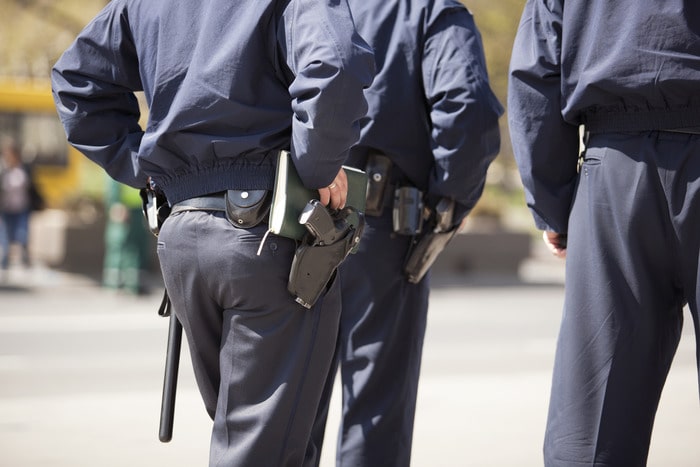
- August 18, 2023
- |security guard company
- | 0
Armed Security Guards –
In the realm of security, armed security guards play a crucial role in maintaining safety and order. However, their duty extends beyond mere protection; armed guards are trained to effectively de-escalate potential conflicts or confrontations to ensure a peaceful resolution.
As a reputable armed security guard company, XPressGuards understands the significance of de-escalation in diffusing tense situations. This article delves into the various de-escalation strategies employed by armed security guards, highlighting their role in fostering a safe and harmonious environment.
1. Understanding De-Escalation
De-Escalation Defined: De-escalation refers to the practice of calming, reducing tension, and defusing potentially volatile situations before they escalate into physical confrontations.
Prioritizing Safety: Armed security guards prioritize the safety of all parties involved, aiming to avoid the use of force whenever possible.
2. Effective Communication
Clear and Calm Communication: Armed guards use clear and calm communication techniques to establish a rapport with individuals involved in potential conflicts. A composed demeanor helps set a non-threatening tone.
Active Listening: Guards actively listen to the concerns and grievances of individuals, acknowledging their perspectives and demonstrating empathy.
Empathy and Understanding: Armed security guards show empathy towards those involved, understanding their emotions and viewpoints. This empathetic approach can help diffuse tension.
3. Non-Verbal Communication
Body Language: Guards use positive body language to convey a non-threatening presence. Open posture, relaxed facial expressions, and appropriate gestures can help create a more receptive atmosphere.
Maintaining Personal Space: Guards respect personal space, avoiding invasive or aggressive behavior that might escalate the situation.
4. Maintaining Calmness
Personal Demeanor: Armed security guards maintain a calm and composed demeanor, which can have a calming effect on individuals involved in conflicts.
Confidence and Control: Demonstrating confidence and control over the situation can reassure those involved, potentially preventing further escalation.
5. Respectful Language and Tone
Choice of Words: Armed guards choose their words carefully, using respectful language that avoids aggressive or offensive terms.
Tone of Voice: A calm and respectful tone of voice contributes to the de-escalation process, helping to defuse heightened emotions.
6. Active Problem-Solving
Collaborative Approach: Armed security guards involve those involved in finding solutions to the conflict. This collaborative approach empowers individuals and reduces hostility.
Offering Options: Guards provide alternative solutions or options to those involved, allowing them to choose a path that leads to resolution.
7. Providing Reassurance
Clarifying Roles: Guards explain their role and the reasons for their presence, reassuring individuals that their safety is a priority.
Outcome Explanation: Armed guards outline potential outcomes of escalated situations, helping individuals understand the consequences and encouraging them to choose a peaceful resolution.
8. Distraction Techniques
Redirecting Attention: Guards employ distraction techniques, such as changing the subject or discussing a neutral topic, to divert attention away from the conflict.
Creating Breathing Room: These techniques allow all parties involved to take a step back and reconsider their actions.
9. Calling for Backup
Team Collaboration: Armed security guards collaborate with their team members to address potential conflicts. Additional guards can provide support and contribute to a peaceful resolution.
De-Escalation Training: Armed guards are trained to recognize situations that might require backup and to call for assistance when needed.
10. Offering Alternatives
Alternative Solutions: Armed guards suggest alternative actions or paths that individuals can take to avoid confrontation.
Finding Common Ground: Guards highlight shared goals or concerns to create a sense of commonality among those involved in the conflict.
The ability to de-escalate potential conflicts or confrontations is a crucial skill that armed security guards possess. Through effective communication, maintaining calmness, employing non-verbal cues, and actively problem-solving, armed guards contribute to the peaceful resolution of situations that could otherwise escalate into violence.
As a trusted armed security guard company, XPressGuards recognizes the vital role that de-escalation plays in maintaining safety and fostering a secure environment for all stakeholders involved. Contact us to learn more information.


